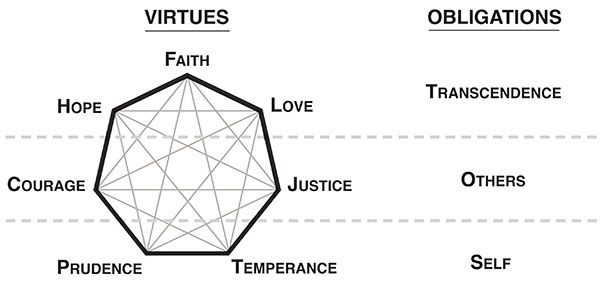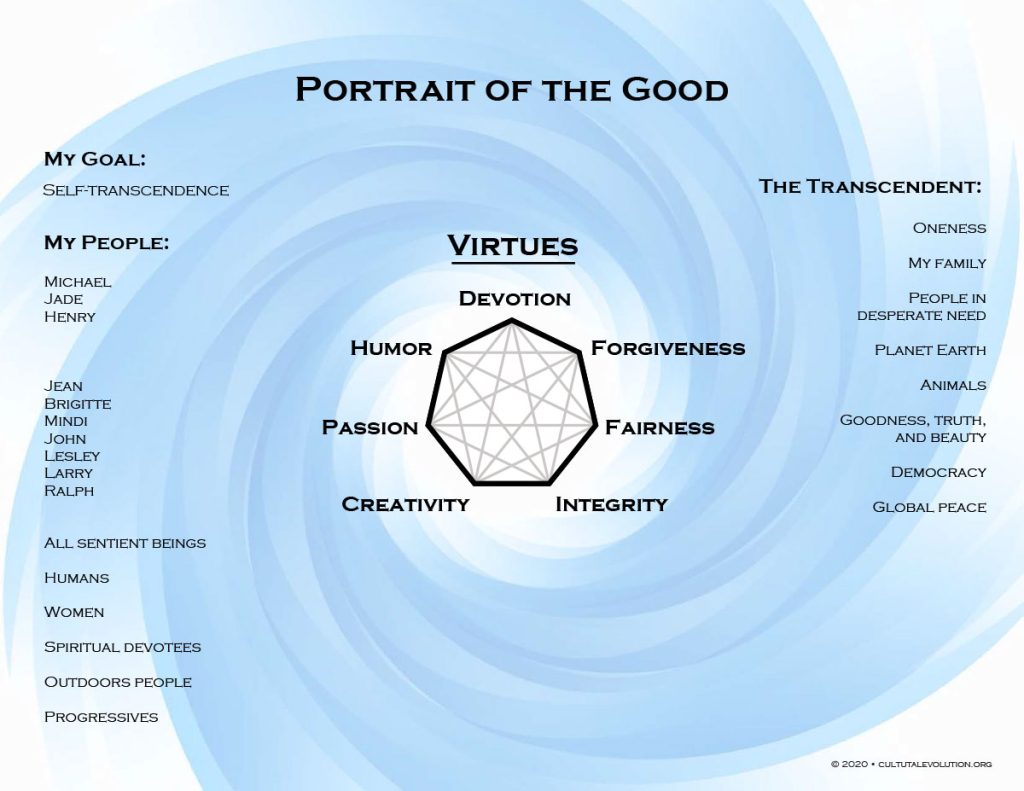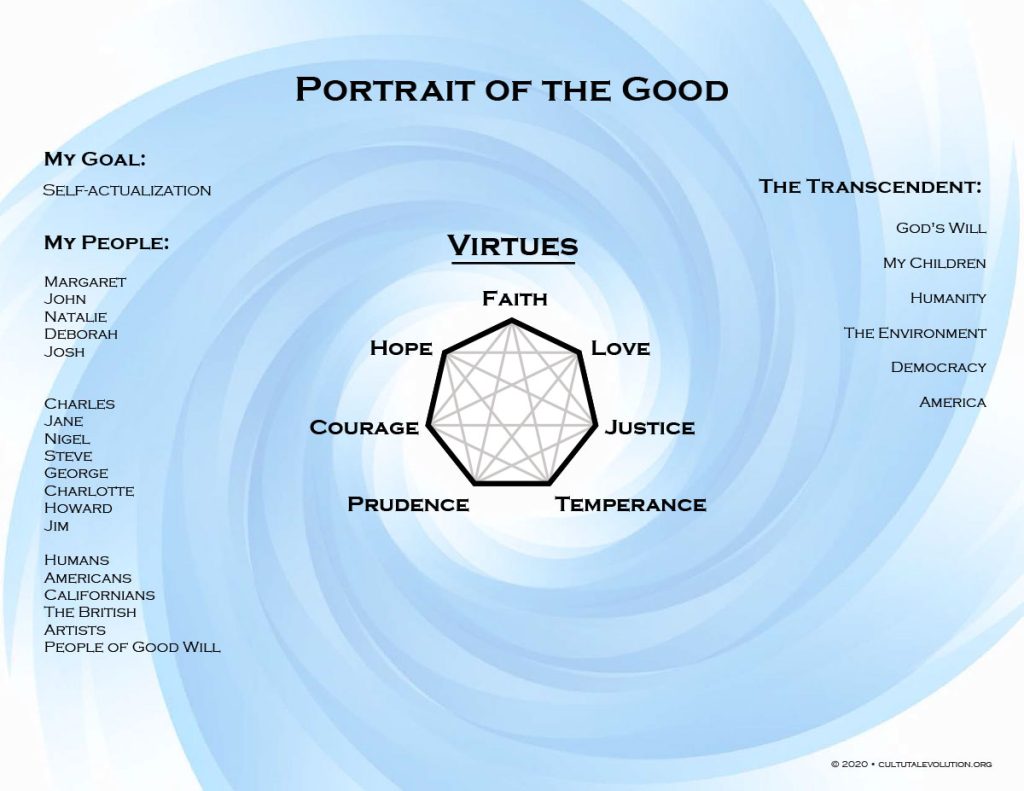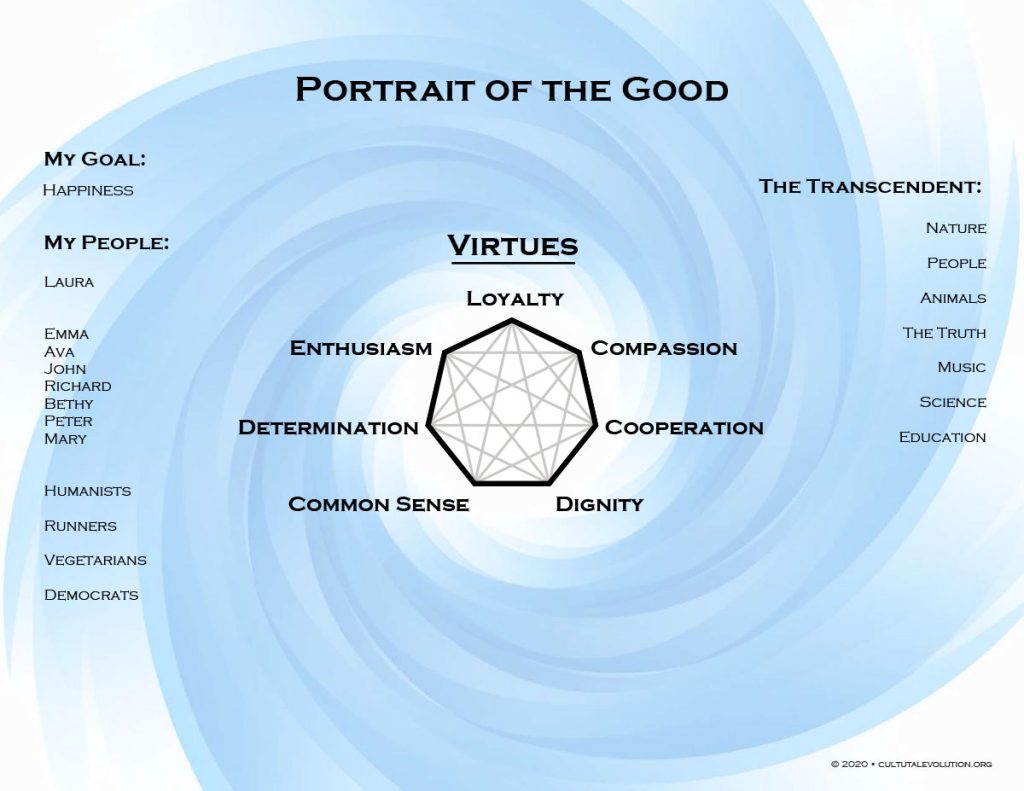The election of Donald Trump is dreadful, literally. I dread what his administration will bring, especially his vow to retreat from our national responsibility to mitigate global warming. Yet as the coming consequences of his political victory begin to sink in, the best possible opening move in our opposition will be a noble response to this ignoble turn of events. In other words, the most effective way to counter Trumpism will be found in an authentically virtuous posture that expresses faith, hope and love.
By electing a questionable demagogue our fellow citizens have sent a clear message to the rest of us that they feel excluded from the American dream. Our countrymen are hurting and they need our help. The most virtuous response thus involves showing that we do in fact care about the demoralized and dispossessed white working class. And the best way to demonstrate this care is to show good faith and a willingness to accept and work with their chosen representative, at least here at the beginning of the fight.
Even with all branches of the government now in Republican hands, liberals and progressives still retain the power of public opinion, which can be stronger than a congressional majority. But the power of our opposing collective voices will be politically ineffective over the next two years if our primary response is self-righteous anger and an attitude of condescending superiority. Indeed, the left’s smug assumption of moral superiority is a big part of what caused the cultural alienation that has resulted in Trump’s election.
This new political emergency accordingly calls on us to rise to a higher level of discourse by adopting a virtuous stance that signals our intention to be more compassionate and inclusive. Since the 1960s American society has achieved significant moral progress by better including and integrating minorities, women, and others who have been historically marginalized. Yet this positive spirit of greater inclusivity has regrettably (and perhaps inevitably) resulted in a politics of identity that has created new forms of exclusion. The white male workers who elected Trump have not only been excluded from the economic progress brought about by globalization, they have also been excluded from the social progress that has brought cultural dignity to minorities and women.
Therefore, the most virtuous response will involve acknowledging that their problems are our problems, and that we are in this together. Liberals and progressives can thus respond positively to Trump by taking up the cause of rehabilitating America’s working class, not only economically, but also culturally. And this must begin by humbly admitting that our progressive social vision needs to be refined and improved so that those who have been left behind can now be reincluded within our circle of care.
The most positive way to view this crisis is to see it as a test. Those of us who believe that progressivism is the most moral form of politics now have an opportunity to demonstrate this conviction by adopting an unexpectedly gracious position that expresses our inclusive and compassionate virtues. President Obama has exemplified such a stance by saying that he is actually rooting for Trump—acknowledging that there are in fact areas where Trump can do some good, such as by rebuilding our national infrastructure. Through his willingness to “root for Trump,” Obama virtuously expressed love for the Americans who see Trump as their savior. We can therefore follow Obama’s lead not only by showing love for those we disagree with, but also by expressing faith in our constitutional system of government, and hope for continued long-term progress, even in the face of this short-term setback.
Admittedly, a significant part of Trumpism involves forms of bigotry that must never be countenanced. But the best way to counter a politics of hate is with a politics of virtue. It is thus by vowing to consistently express the virtues of faith, hope and love in the context of our opposition that we can, in time, reclaim a higher level of leadership.







I have been stimulated to much thought by Steve’s article, and the many comments. Having a long association with Jungian thought, I found Steve Rohrbach’s opening comment about bringing the shadow out into the open incredibly important. From the perspective of Cultural Evolution, many events can really be discouraging. But, at 79 years of age, I often find courage in Victor Hugo’s statement in Les Miserables, that reflects the need for a long term perspective, when we consider things relating to any form of evolution, and perhaps particularly of culture evolution. Making allowances for some of Hugo’s expressions that may seem quaint and dated to us, I think we can be encouraged by his words;
“Les Miserables. Victor Hugo.
Progress is man’s mode of existence. The general life of the human race is called Progress, the collective stride of the human race is called Progress. Progress
advances; it makes the great human and terrestrial
journey towards the celestial and the divine: it has its halting places where it rallies the laggard troop, it has its stations where it meditates, in the presence of some splendid Canaan suddenly unveiled on its horizon, it has its nights when it sleeps; and it is one of the poignant anxieties of the thinker that he sees the shadow resting on the human soul, and that he gropes in darkness without being able to awaken that slumbering Progress”. Thanks Steve. Stan Gower, Melbourne Australia.
I want to say, “yes,” to Steve’s perspective, and every single response here in the thread. I picked up again a great book, “The Fourth Turning” that speaks to the cyclical nature of our anglo-saxon American history, and how we’re due for our “Crisis” period. Written in 1997 it pretty much predicts Trump. Scary stuff. What I’ve been feeling is that this is an era of dissolution and disillusion that, if we keep our heads above water and our hearts open, will allow us to transcend and include. It’ll be bumpy, scary and testing, but we will make it through. All of these ideas you’ve all proposed are great, and I want to say, what will actually get us through will not come from our current state of mind or thinking, but by one that will be revealed through the process. Evolution is messy.
Thanks for writing this.
“Our countrymen are hurting and they need our help.” By this I assume you’re thinking of the mostly rural, largely white left-behind-by-globalization people who swung this election by, depending on how you count, a couple hundred thousand votes in PA, MI, and WI. My wife’s clan is in that group, and they sort of say the same thing about us progressives — we need their help.
The slide into condescension seems to be a two-way street.
I’m going to Western PA to hunt with the clan this holiday weekend. Girded to bite my tongue, but also respect values different than my own that often are, as a contrivance of memetic categorization, too easily bucketed as a lower level of development. As much as the developmental ladder may be real, even the call for compassion can be more supportive of divisive structures of collective ego than transcendent of them.
I agree with most of what you write about, especially the call for greater equanimity and decency. And, most importantly, for us to step back and recognize we have a constitutional government (and the civic society that upholds it) that changes only slowly. Many are the mirrors to reflect Trump’s imperfections, and many are the powerful interests that will hold sway against him.
Divisions are real, no doubt, but in listening to my family, some of whom pay very close attention to politics and contribute great time and money to conservative causes, I’m pretty convinced that the president-elect is not walking on thick ice.
Have to say, Steve, your assertion that “a significant part of Trumpism involves forms of bigotry and ugliness” is complete nonsense. There is a fringe in any group, of course. My daughter, from SFO, posted on Facebook a similar line, “How will I explain to my daughter that half of America thinks it’s okay to demean women and immigrants.” I suggested to her that, by her logic, the other half thinks it’s okay to demean America with perjury, obstruction of justice and violation of Federal law. Of course, very few Americans would confess any such approval, nor would they approve of bigotry or racism. So, let’s watch our language and broad accusations. What’s called for, as Otto Scharmer might say, is a Greater Presence to what’s possible, a possibility, in fact, that you are also pointing to.
Nice piece. I think we simply need to create a mental frame around poor and truly middle class white men versus rich white men. The experiences of the two groups are very. difflerent. The latter group does not feel particularly advantaged, and suffers great stress in our current social and economic reality (as do minorities, and we need to see it as a zero-sum contest). Rising drug use and suicide ratea show this.
Further, the $72 thousand dollar per year voter is not a rich person given how far that dollar goes, and in light of today’s enormous wealth inequalities. Celebrities, hedge fund managers, and athletes may make that much in a day or less. But the middle class man – and his presumptive partner or wife – do not feel secure. A mass of the country lives pay check to pay check. Few feel calm today’s world of mass mergers, changing industries, and layoffs.
Finally, being stereotyped hurts. Simply, on a visceral level. The left – or part of it – has been engaged in what can only be called the complete “dismissal” of any kind of positive white identity, fully non ironic and usually venomous portraits of white men. Particularly as the identity politics coming from the academic left. This needs to stop except when truly necessary. It needs to stop being a reflexive response to social issues – that white racism is an all purpose causal factor when it isn’t clear that it is.
Mark,
What is your description of “positive white identity”?
I admit this is an incredibly complicated question Greg. So I’ll just throw out some thoughts…
I would say… Something that redeems the incredibly positive contributions of white, Western, Christian culture in the creation of liberal democracy – and provides that emotional capital to those of that background – while not needing to constantly remind them of the entire run of historical negatives in a way that places a collective guilt on them (that most of them have not really ever been involved in).
This is a tricky situation. It’s basically like saying, How does one do identity politics? Identity politics – for all us, for everybody – includes some kind accentuation of the positive dimensions of the group while there is a pragmatic de-emphasis on the negative. It’s an act of faith in a sense. One that doesn’t shame when it could try to, and calls forth the better angels of peoples’ natures in the recognition you will win most of the room (as Obama, for example, has done and is heading out with a Reagan-esque 55% popularity rating and probably would have won a third time if he could have).
Right now, in other words, the left gives almost no way for white people to be “good people,” other than by denouncing a whole list of things that most of them already don’t like. (Also, it does this to men, but that’s too much to get into).
That is how I see it. It’s also how I have experienced it. I feel I have a slight opening here because, being Jewish, I don’t see myself as part of that lineage. I feel for white guys (and gals) who don’t have that bit of room and don’t have any outsider cred with which to defend themselves. And I feel like I’ve spent almost 15 years just carving out that space in my head, against that kind of rhetoric, because the fog is so thick in progressive culture.
I also feel for the minority position. Trump was awful, unforgivable in that regard. Trust me when I say I see Trump as the bigger enemy. But I also think we’re entering into a world where, in a pluralistic society, everybody is entering (in a felt sense) into some kind of minority position. I am not trying to draw a false equivalency. But I am saying that, subjectively, that’s where we are going.
In that way, the great lesson here, even if Trump had lost, is the emergence of a kind of post-civil rights “white” identity politics. I’ll put white in quotes here because I don’t think it’s entirely about race; I don’t even know if it mostly about race. Race is a proxy for economic, geographical, educational, religious and other forces. Just as race/ethnicity is a proxy for a host of complex issues that impact Latinos, African-Americans, and Jews but that we use that shorthand.
If the left doesn’t moderate itself, especially if mainline academics and leaders don’t, and don’t allow for some reconstructed version of “white Western identity,” we will all lose and we will empower the Trumpians of the world.
We have to be post-PC or we give the world to people who are pre-PC.
Here’s a summary worth reading, of “the Democrats’ Big Mistake”, that urges Democrats to re-consider a more inclusive and comprehensive strategy:
https://www.yahoo.com/news/the-democrats-2016-mistake-100053074.html
Thanks, Steve, for rallying around a positive position, advancing life for all Americans. However, there must be a recognition of the “victimology” business that Democrats are enrolled in. If the victims disappear, Democrats have no constituency. A judicious, rationale inquiry with comprehensive engagement will transcend and include anyone who feels “left out”. Too often, those “left out” are trapped in their own version of a victim story. Making the other side wrong perpetuates the story. Painting others with a black brush hides the real issues. We credit government with way too much capacity to solve problems that, for the most part, are internal. See Sean Stephenson’s TED Talk on “the prisons of our mind”.
I am highly skeptical of this approach – and think it may be foolish and dangerous in the way that ‘appeasement’ proved dangerous when dealing with the rise of the Third Reich. It could be a classic green fallacy of meeting every level with compassionate inclusion and empathy without realizing you might be dealing with a insane fascist that is going to run you over with his tank and has no sane grasp on reality which allows for civil disobedience or sand, rational collaboration. I personally believe we are dealing with a regressive egocentric and/or ethnocentric spike in our culture… and one that is very ‘sick’ on many levels. I think that to normalize, minimize, or cooperate with it carries massive potential danger. I think the impulse to calm ourselves down and not panic is understandable – but at the same time, I think it may partially be coming from our being so afraid of how perilous the actual circumstances are, that we aren’t able to face it and truly take in the magnitude of what is already upon us. We are, i think, in a kind of denial to a large degree… we are careening towards a very likely hugely dark and painful time, and it hasn’t really sunk in how bad it is and how much pain there is. Once we get real, scary and overwhelming as it is, then we can admit what a dire problem we have and start to take the unfathomably painful and seeming impossible steps to stop the bleeding and someday heal. I think we need to wake up and fight for the good and against sickness in the hearts and minds of the American People. Some times require that we step up, and, ugly as it is, we have to be willing to recognize darkness and ‘evil’ by any other name, for what it is. We must be willing to take a stand that says, “absolutely not, I will not stand by and allow this! I fight for what is good, right, and humane, and I am willing to pay the greatest sacrifice to do so, if needed.”
Hi Steve,
I agree with your overall stance of virtue, compassion and understanding. Yet, as a member of a “minority” (a descriptor I deplore for its connotation of “less than”), I must say that I find ironic the claim that white males have been excluded “socially.”
“The white male workers who elected Trump have not only been excluded from the economic progress brought about by globalization, they have also been excluded from the social progress that has brought cultural dignity to minorities and women.”
The cultural dignity of white men, previous to the Civil Rights movement, largely came from their automatic status ABOVE so-called minorities, no matter the class differentiation. When one has been a scapegoat for a few centuries, feeling sorry for those whose dignity came at my expense can be a tall order indeed.
I wonder if white men feeling left out will cause them to better relate to those who have been left out in the past (and currently too)? I won’t hold my breath. One element that this election demonstrates is a reactionary turn to white nationalism. That’s not as causal as the economic stress, no, but should be factored in nonetheless.
Yet to evolve beyond the current morass in which both progressives and conservatives are culpable, I agree that we must exhibit the very qualities you suggest, my friend.
Steve, I appreciate your attempt to help us enter this new era with the grace of a noble response. But I see your well-intentioned call for progressives to adopt this “authentically virtuous posture of faith, hope and love” as short-sighted, certainly not “fair and balanced.”
Of course compassion is more powerful than hate; love is our standard. Most progressives have been championing “virtuous responses” for ages! And now these bleeding hearts are summoned to include the “demoralized and dispossessed” white male worker minorities. I’m not disparaging the need for empathy, indeed, we’re all in this together. But you seemed to suggest other minorities have already arrived, also that only progressives need to act. It does seem that Progressive hearts are largely responsible for American society having “achieved significant moral progress” through including/ integrating marginalized minorities, many still feeling excluded from the dream. Perhaps you’re suggesting we are the standard-bearers.
Given this, my humble view sees politics of EXCLUSION as the dismissive child of a righteous condescending Right. I would suggest that Identity Politics, like Affirmative Action, is a shabby backlash against exclusion behavior coming from the Right. (Isn’t such legislation designed to regulate selfish souls who do not self-regulate empathetic responses?) And it seems you’ve belittled identity politics while sanctioning empathy for white male identity (which unchecked could have serious backlash in a Trump presidency.) Regardless, there’s far too much ‘projection’ on both sides.
Steve, I’d feel better if I’d heard you oblige some ‘love and good will’ from the Right in these ominous days ahead, especially given their anticipated slash and burn against any “significant moral progress”. Will they be willing to design their budgets as the moral documents they need to be?
It would be most refreshing for me to see the Left not only continue to “speak softly” from high moral ground but, dare I say, grow some cohones and wield an occasional “big stick!”
Ultimately, as you well know, our task is uncovering the underlying causes for polarization, discovering values shared by both sides, striving to make each other’s life meaningful. Mutual understanding will beget the love that’s so sorely needed. Thanks, Steve, for your stimulating post.
Beautifully expressed Steve, thank you. This feels like very welcome and astute guidance for how to respond to this moment.
A well said piece written by a friend…
… The gift of the Trump candidacy is that our Shadow has burst into consciousness, the only place in which it can effectively be dealt with and resolved.
So, what are the critics, losers, forgotten, bewildered and betrayed to do? First, accept that the outcome of this election is just what this country needs if it is to grow and mature. Second, recognize the dark face of America for what it is and meditate on who we are and who we’re destined to be as a nation. Third, recognize that there are millions of Americans who are legitimately alienated from government, that Americans have collectively created a Frankenstein that Greg Palast refers to as the “best democracy money can buy,” and that society and the economy do not work for lots of Americans. If the Trump campaign hasn’t convinced you, just ponder the strength and breadth of appeal of Bernie Sanders’ unlikely grassroots populist campaign.
Finally, organize and begin to act locally and (re)build from the grassroots up. Address things like corporate personhood, election funding, social injustice, media centralization and control, the power and values of big banks and Wall Street, government “handouts” versus incentives (at all levels), regulation of the too-big-to-fail and going easier on the little guy, political activism, servant leadership, and world citizenship.
Face it! This can be the next stage of the revolution that gave us the civil rights, environmental, women’s, and LGBT movements, among others.
A century and a half ago a Republican president identified a potentiality that we have yet to manifest: a government of, by and for the people. When and if we take the idea seriously, we CAN make it a reality. It won’t be easy. It will take a lot of work. And it will be incredibly rewarding.
The alliance that propelled Trump to the presidency reminds of what happened in Italy in 1929 when Mussolini was elected Prime Minister. The richest Italians formed an alliance with the low middle classes. The barbers, shop keepers, artisans etc. who saw the rise of a unionised working class, that had significantly improved its standard of living, as an affront to their standing in society and their earning ability. Left out and with no representation the low middle classes where courted by the son of a rural blacksmith. Mussolini was backed by the richest industrialists and the Italian financial elites who where terrified by the rise of the strongest socialist party in Europe.
The richest Republicans would have never taken power without the support of the poor american Heartland.
Steve, I agree with Lynne Feldman that your analysis in this case is partial. Yes, clearly there are many of our fellow citizens in the “white working class” category who have suffered economically in the past 30 years. But in the Republican primaries, the median income for Trump voters was $72K. As the 538 website noted on May 3, 2016, “His (Trump’s) voters are better off economically compared with most Americans.”
Given this, the other most likely motivations for Trump voters are white privilege and patriarchy.
I’m not saying that I disagree with the response that you advocate, although it is certainly challenging at times. What I am saying is that we need to identify the phenomena of the election accurately and systemically. Trump would not have won with either of these groups alone. He needed both. I suggest that it is important to identify and understand the distinctions between these two groups of our fellow Americans.
Great thoughts Steve and a solid foundation for fierce love and slaying the dragons of blind greed without consideration of consequences, focus on me rather than we, hyper-masculinity, and benefits for the few at the expense of everyone else and the planet. Onward and upward.
Thanks for this great and thought provoking post!
While responding virtuously is certainly a kind and progressive thing to do, it seems to me that this is an employment and education problem and that those lost manufacturing jobs are not coming back, regardless the rhetoric. Virtue won’t hurt, but it won’t feed and support the forgotten workers of America. They need to be retrained for the jobs of the future.
The last 8 years have added many jobs, but not for non-college educated workers. Of the 11.6 million jobs added after 2008, 11.5 million went to the college educated, only 80,000 went to the non-college educated. If this trend continues, what can be done to ease the suffering of the working class? They surely must be trained for the world that we currently live in.
The caveat that I must interject in the “true but partial” analysis is the high number of very wealthy Trump voters. I live in one of the wealthiest counties in the US. Almost every house, McMansion, and multi-acre estate sported a Trump sign. When asked why, the ones I questioned mentioned the huge tax breaks they were expecting. This is no problem for us to solve, Steve. This is sheer selfishness, lack of empathy, egocentrism, etc. Those same people hated Obama because they had to offer their stock clerks, busboys, service station gas pumpers health care. Their hatred was so palpable that my husband and I could no longer join any of them for dinner. I think we need training in empathy!
What you are saying here rings true to me, Lynne. I too would like to see a more objective analysis and breakdown of reasons for people’s votes. A coworker told me that he voted for Trump because he opposes abortion.
Dear Lynne, David, and Sue,
I vowed to write an initial piece on the election that was less than 700 words. So I agree that there is certainly more to the situation than I have touched on here. Thanks for your comments.
I am so grateful to have direction from an Evolutionary Perspective. I choose not to lay down and be a victim, but to raise the level of progressive action and Love to the very best of my ability.
Well said, Steve! This is precisely the view we must take now as American citizens. Good work!